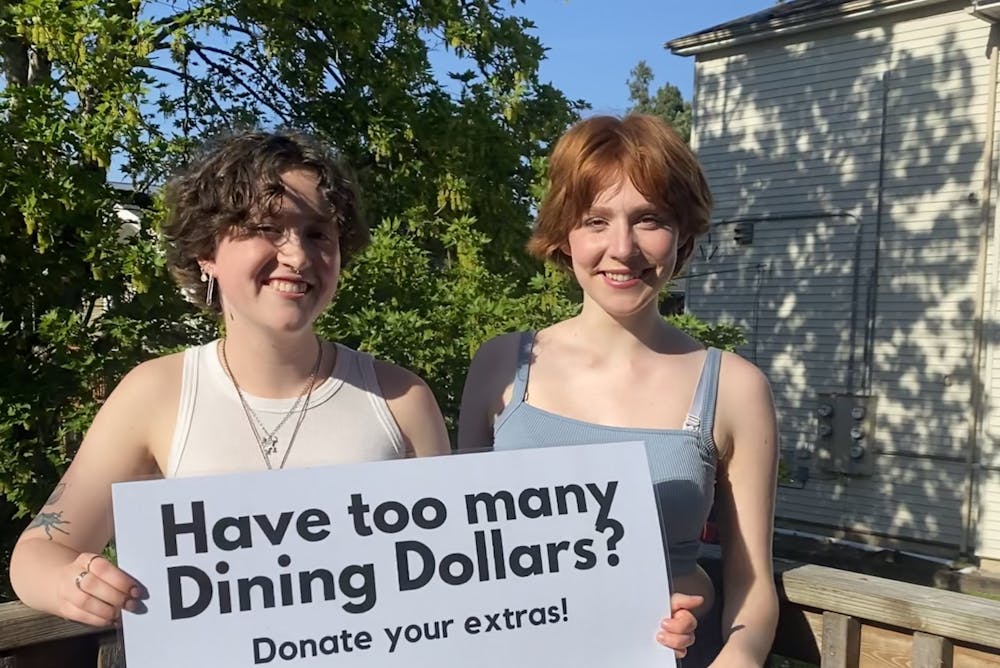Correction: A previous version of this story misidentified WHOLE as being out of the Student Advocacy and Identity Resource Centers that no longer exists. WHOLE is operated out of the Leadership and Community Engagement Center. This story has been updated for clarity and to correct the error.
Western Washington University students Leo Curtis and Adele Delignette co-founded the Dining Dollars Project last spring as a solution for students to donate unused dining dollars back to the Western and greater Bellingham communities.
Curtis and Delignette, both third-year students, started the project out of their home because they recognized dining dollars as an untapped source that could help battle food insecurity on and off campus.
“We saw that dining dollars were a product that wasn’t being used and that there was a need for dealing with food insecurity in our community,” Curtis said.
Dining dollars can only be used at on-campus markets, restaurants and cafes and, while they do roll over quarter to quarter throughout the year, they are reset at the end of spring quarter.
The founders of the project say it was born out of frustration with wasted resources when food insecurity is a prevalent issue. According to the Whatcom Community Foundation, an estimated one in five Whatcom County residents are experiencing food insecurity.
“We can do things better,” Delignette said.
The Dining Dollars Project works by collecting donations in the form of food items and toiletries purchased from on-campus markets and then evenly splitting them between the Western Hub of Living Essentials Food Pantry on campus and local, off-campus mutual aid groups, including Road2Home, a Bellingham non-profit providing housing and other resources to unhoused people.
The WHOLE Food Pantry, coordinated by the Leadership and Community Engagement Center, is located in Viking Union 435 and is open during regular VU hours.
The food pantry, which operates on a no-questions-asked, self-service basis, provides free food, including vegan, gluten-free and dairy-free options. Besides food products, the pantry also provides personal care products such as shampoo and toothpaste.
Jenn Cook, Western Club Activities manager, oversees the WHOLE Food Pantry. While the Food Pantry’s usage is not officially tracked, visitors regularly use the space throughout the day, she said.
While the WHOLE Food Pantry and other on-campus food pantries are available resources, first-year Western student Clayten Nix wishes food assistance programs, both on- and off-campus, were more accessible and easier to navigate.
Nix, who is struggling to make ends meet, resorts to donating plasma and other odd jobs to make a little extra cash. He shops based on his finances, not his hunger, he said.
“I can’t really afford groceries until I get paid,” Nix said.
When Nix applied for the Washington Supplemental Nutrition Assistance Program, commonly known as food stamps, he was told he did not meet the eligibility requirements, which was a frustrating experience.
With students like Nix, as well as the greater Bellingham community, in mind, Curtis and Delignette have dedicated hours to the Dining Dollars Project.
“We both do a little bit of everything,” Curtis said.
Curtis oversees the distribution of products into the community, as well as the project’s communications. They advertise through word of mouth, Instagram and their Linktree site.
Delignette handles donations, as well as the bureaucratic side of the project, including communicating with university administration and negotiating contracts with food suppliers.
In negotiations with food suppliers, Delignette wants to ensure food accessibility stays a priority.
“I want to make sure that we still retain those goals of giving extra resources to people who need it the most,” she said.
Currently, she is coordinating with Aramark to introduce donation boxes in the on-campus markets for the last three weeks of every quarter. The introduction of donation boxes inside the markets will allow for a more seamless donation process, as well as increased awareness of the Dining Dollars Project.
With this new donation system, students will purchase goods, place them in the donation box, then scan a QR code which takes them to an online form where they fill out the type and amount of products donated, which lets Delignette and Curtis know when to empty the donation boxes.
As the Dining Dollars Project gains traction, Curtis and Delignette are hoping to integrate it into university operations, similar to the Swipe Out Hunger program. Currently, the Dining Dollars Project is recognized as a club, meaning Curtis and Delignette run everything themselves with the help of volunteers.
As third-year students, Curtis and Delignette want to make sure the initiative continues to serve the community once they graduate.
“We want to make sure it lives on once we leave school,” Delignette said.
Curtis and Delignette can best be reached through Instagram or over email for questions, suggestions, donations or volunteer opportunities.
Thalia Coulter (she/her) is a campus news reporter for The Front. She is in her second year at Western and is a public relations major with a Spanish minor. When not on campus or at work, Thalia can be found grabbing a bite to eat downtown with friends. You can reach her at thaliacoulter.thefront@gmail.com.






